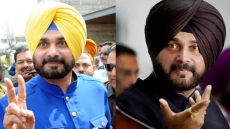All eyes were on Karnataka Governor Vajubhai Vala on Tuesday after hotly-contested elections threw up a hung Assembly, forcing the BJP and a hurriedly stitched alliance of the Congress and the JD-S to stake claim to form a government.
The BJP, which appeared confident of returning to power in its only southern bastion, emerged as the single largest party but failed to cross the half-way mark in the 224-member Assembly where two constituencies didn't vote on Saturday.
The Election Commission data showed that the BJP could end up with 104 seats -- eight short of simple majority.
The Congress appeared to have learnt from its mistakes in Manipur and Goa where it, despite emerging as the single largest party in both states, reacted late and gave the BJP enough time to cobble together an alliance with smaller parties to form governments there.
This time, the Congress, set to win 78 seats, sprung a surprise and quickly announced its support to the Janata Dal-Secular which finished third with 37 seats in a bid to keep the BJP away from forming a government.
Congress General Secretary Ghulam Nabi Azad told the media in the company of outgoing Chief Minister Siddaramaiah that the JD-S and the Congress "will meet the Governor and stake claim (to form a government)".
Led by former Prime Minister H.D. Deve Gowda, the JD-S quickly accepted the offer and wrote to the Governor staking claim to power.
Both JD-S leader and former Chief Minister H.D. Kumaraswamy and Siddaramaiah of Congress then met the Governor and staked the claim to form a government.
"I have accepted the support extended by the Congress to form the government," Kumaraswamy said.
That happened after BJP leader and its Chief Ministerial candidate B.S. Yeddyurappa met and urged the Governor to let him prove his majority support in the Karnataka Assembly. He was accompanied by Union Minister Ananth Kumar.
The ball now lies in the Governor's court. According to usual practice, the Governor calls the leader of the single largest party or pre-poll alliance to form the government.
In the case of a hung Assembly, the leader is asked to prove the majority on the floor of the House within a stipulated time.
In Karnataka, the Congress and JD-S did not have a pre-poll alliance. However, it is for the Governor to take a call on who to invite first.
The dramatic turn of events that saw BJP's jubilations swinging up and down throughout the day spoiled its hopes to form its own government in Karntaka -- its gateway to the south.
According to party sources, three senior ministers -- Dhamendra Pradhan, Prakash Javadekar and J.P. Nadda -- have been rushed to Karnataka to strategise with the local leadership.
Mocking at the "desperation of a defeated Congress" to support the JD-S to form a coalition government to keep the BJP out of power, BJP spokesman Shantaram said his party was open to an alliance with the JD-S or seek its support to form the new government.
"We are open to JD-S support, if need be, after all the results are declared. Our approach to JD-S will depend on the number of legislators we need to prove majority in the house or win the confidence motion," he said.
BJP activists and leaders earlier celebrated noisily in both Bengaluru and New Delhi, waving party flags and shouting slogans hailing Prime Minister Narendra Modi, their main vote-getter, and Amit Shah.
Expectations of a BJP victory in Karnataka lifted the key Indian equity indices during the mid-morning trade session on Tuesday. But the markets later went into the red.
HOW KARNATAKA DALIT, LINGAYAT CARDS DIDN'T WORK FOR CONGRESS
Two of the major chunks of voters that the Congress was banking on in Karnataka were Dalits and Lingayats and on Tuesday as election results were declared both appeared to have voted in large numbers for the BJP.
In fact, the Congress in 2013 rose to power in the southern state with a strong backing of minorities, backward classes and Dalits and the same coalition led to its ouster in 2018.
The Congress desperately tried to add to the coalition the Lingayat factor by granting religious minority status to the community - a move that didn't work to its advantage.
Dalits and Scheduled Tribes in Karnataka are huge in numbers anywhere between 20 to 23 per cent, enough to make or break prospects for any political party to come to power.
Take a look at the past elections of Karnataka.
In the 51 constituencies reserved for the Scheduled Castes and Scheduled Tribes, the BJP got just seven in 2013 while the Congress got 26 and JD-S 11. The BSR Congress bagged four seats while two went to independents. The Congress scored an easy majority.
In 2008, when the BJP won the mandate as the single largest party, it bagged 27 and the Congress 17. The JD-S won nine.
And cut to 2018 that threw up a hung verdict. The BJP and the Congress appeared neck and neck winning 23 and 19 seats respectively. The JD-S grabbed eight. The end result is a hung assembly which was a similar case in 2004.
Dalits have traditionally been supporters of the Congress but the BJP has successfully managed to break into the support bases, particularly since the 2004 polls when it managed a social engineering exercise to attract a section of Dalit voters - called the Left Dalits.
The Left Dalits are considered the most marginalised among such communities.
The Congress also tried to woo BJP Chief Ministerial face B.S. Yeddyurappa's own caste - the Lingayats - a traditional BJP support base. They have influence on nearly 100 seats in the 224-member assembly and make up 17 per cent of the state's population.
The Congress hoped that that by playing the religious minority card, it would split the BJP's vote base as Lingayats appeared going back to Yeddyurappa after voting against him in 2013. But the experiment seemed to have failed.
The BJP won from the majority of Lingayat dominated seats - mainly in north Karnataka (Hyderabad Karnataka) and parts of the central region.
In 2013, when the Congress emerged a clear winner, it won 47 seats in Lingayata heartlands, against just five for the BJP.
'JD-S COMMITTED TO SECULARISM, RECONCILED TO CONGRESS SUPPORT'
The Janata Dal-Secular (JD-S) is reconciled to accept Congress support to form the new government in Karnataka due to the JD-S's commitment to secularism, a party leader said on Tuesday.
As party supremo and former Prime Minister H.D. Deve Gowda is committed to secularism and wants to work for the minorities, the JD-S would be comfortable in forming the new government in Karnataka with Congress support, JD-S Spokesman Ramesh Babu told IANS here.
"The Congress and BJP are both sides of the same coin and we wanted to maintain equidistance from both, but we are not keen on the BJP as its chief ministerial face B.S. Yeddyurappa went to jail on graft charges."
"We have thus agreed to take Congress support to form the new government after a fractured verdict thrown up by the results," he added.
Asked if it would be a JD-S-led coalition government, Babu said it was premature to say so, as the party's core committee would decide on the form and structure of the government in consultation with the Congress.
Congress leaders Ghulam Nabi Azad, G. Parameshwara and Mallikarun Kharge are meeting Kumaraswamy to discuss the government formation," added Babu.
Of the 222 constituencies where polling was held on May 12, the BJP won in 101 seats and was leading in three, while the Congress won 78 and JD-S won 37 seats.
JD-S ally Bahujan Samaj Party (BSP) has won one seat.
Elections in Raja Rajeshwari (RR) Nagar in Bengaluru southwest was postponed to May 28 and countermanded in Jayangar in Bengalur south following the death of BJP candidate and MLA B.N. Vijaya Kumar on May 4.
"Though the BJP has emerged as the single-largest party with 104 seats, it does not have the numbers to form the government, as it is still eight short of the halfway mark of 112," Babu reasoned.
On the consent of JD-S supremo and former Prime Minister H.D. Deve Gowda, Babu said the party's state President H.D. Kumaraswamy had agreed to the Congress support ostensibly to keep the BJP out of power in the southern state.
"As JD-S and Congress have the numbers (38+78), which is over the 112 halfway mark, we should be allowed to form the government to prove majority on the floor of the house," the JD-U leader said.
Hoping that the BJP would not do backdoor politics to regain power and respect the combined numbers the two parties have got, Babu said Kumaraswamy had agreed to the Congress offer, as the Supreme Court had allowed parties with majority to form a government if the single-largest party (BJP) did not have enough seats.
"Kumaraswamy said ahead of the elections that whichever party implements the JD-S manifesto would get its support in case of a hung verdict," Babu said.
As a regional party, the JD-S has agreed to the Congress support to safeguard the state's interests, especially of its farmers, women and the poor.
Kumaraswamy became the Chief Minister in February 2006 with BJP support and headed the first coalition government in the state for 20 months till October 2007.





